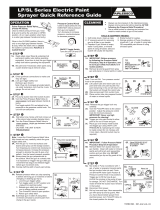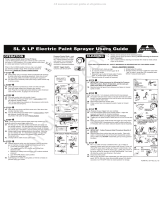
This symbol indicates a hazardous situation, which, if
not not avoided could result in death or serious injury.
HAZARD: INJECTION INJURY
A high pressure paint stream produced by this equipment
can pierce the skin and underlying tissues, leading to
serious injury and possible amputation. See a physician
immediately.
DO NOT TREAT AN INJECTION INJURY AS A SIMPLE CUT!
Injection can lead to amputation. See a physician immediately.
The maximum operating range of the gun is 3000 PSI/207 BAR uid
pressure.
PREVENTION:
• NEVER aim the gun at any part of the body.
• Do not aim the gun at, or spray any person or animal.
• NEVER allow any part of the body to touch the uid stream. DO
NOT allow body to touch a leak in the uid hose.
• NEVER put your hand in front of the gun. Gloves will not
provide protection against an injection injury.
• ALWAYS lock the gun trigger, shut the pump off, and release all
pressure before servicing, cleaning the tip or guard, changing
tip, or leaving unattended. Pressure will not be released by
turning off the motor. The PRIME/SPRAY knob must be turned
to PRIME to relieve the pressure. Refer to the Pressure Relief
Procedure (page 7) described in the pump manual.
• ALWAYS keep the tip guard in place while spraying. The tip
guard provides some protection but is mainly a warning device.
• ALWAYS remove the spray tip before ushing or cleaning the
system.
• Paint hose can develop leaks from wear, kinking and abuse. A
leak can inject material into the skin. Inspect the hose before
each use. Do not use hose to lift or pull equipment.
• NEVER use a spray gun without a working trigger lock and
trigger guard in place.
• All accessories must be rated at or above 3000 PSI/207 BAR.
This includes spray tips, guns, extensions, and hose.
NOTE TO PHYSICIAN:
Injection into the skin is a traumatic injury. It is important to
treat the injury as soon as possible. DO NOT delay treatment
to research toxicity. Toxicity is a concern with some coatings
injected directly into the blood stream. Consultation with
a plastic surgeon or reconstructive hand surgeon may be
advisable.
HAZARD: HAZARDOUS VAPORS
Paints, solvents, insecticides, and other materials can
be harmful if inhaled or come in contact with the body.
Vapors can cause severe nausea, fainting, or poisoning.
PREVENTION:
• Use a respirator or mask if vapors can be inhaled.
Read all instructions supplied with the mask to be
sure it will provide the necessary protection.
• Wear protective eyewear.
• Wear protective clothing as required by coating
manufacturer.
English
2
Important Safety Information · Read all safety information before operating
the equipment. SAVE THESE INSTRUCTIONS.
To reduce the risks of re or explosion, electrical shock and the injury to persons, read and understand all instructions included in
this manual. Be familiar with the controls and proper usage of the equipment.
HAZARD: EXPLOSION OR FIRE
Solvent and paint fumes can explode or ignite. Property
damage and/or severe injury can occur.
PREVENTION:
• Provide extensive exhaust and fresh air introduction to keep the
air within the spray area free from accumulation of ammable
vapors. Solvent and paint fumes can explode or ignite.
• Do not spray in a conned area.
• Avoid all ignition sources such as static electric
sparks, open ames, pilot lights, electrical
appliances, and hot objects. Connecting or
disconnecting power cords or working light
switches can make sparks. Paint or solvent
owing through the equipment is able to result in
static electricity.
• Do not smoke in spray area.
• Fire extinguisher must be present and in good working order.
• Place pump at least 20 feet (6.1 meters) from the spray object in
a well ventilated area (add more hose if necessary). Flammable
vapors are often heavier than air. Floor area must be extremely
well ventilated. The pump contains arcing parts that emit sparks
and can ignite vapors.
• The equipment and objects in and around the spray area must
be properly grounded to prevent static sparks.
• Keep area clean and free of paint or solvent containers, rags
and other ammable materials.
• Use only conductive or grounded high pressure uid hose. Gun
must be grounded through hose connections.
• Power cord must be connected to a grounded circuit.
• Always ush unit into a separate metal container, at low pump
pressure, with spray tip removed. Hold gun rmly against side
of container to ground container and prevent static sparks.
• Follow the material and solvent manufacturer’s warnings and
instructions. Know the contents of the paints and solvents being
sprayed. Read all Material Safety Data Sheets (MSDS) and
container labels provided with the paints and solvents. Follow
the paint and solvent manufacturer’s safety instructions.
• Use extreme caution when using materials with a ashpoint
below 70ºF (21ºC). Flashpoint is the temperature that a uid
can produce enough vapors to ignite.
• Plastic can cause static sparks. Never hang plastic to enclose
a spray area. Do not use plastic drop cloths when spraying
ammable materials.
• Use lowest possible pressure to ush equipment.
• Do not spray onto pump assembly.
HAZARD: EXPLOSION HAZARD DUE TO
INCOMPATIBLE MATERIALS
Will cause property damage or severe injury.
PREVENTION:
• Do not use materials containing bleach or chlorine.
• Do not use halogenated hydrocarbon solvents such as bleach,
mildewcide, methylene chloride and 1,1,1 - trichloroethane. They
are not compatible with aluminum.
• Contact your coating supplier about the compatibility of material with
aluminum.





















